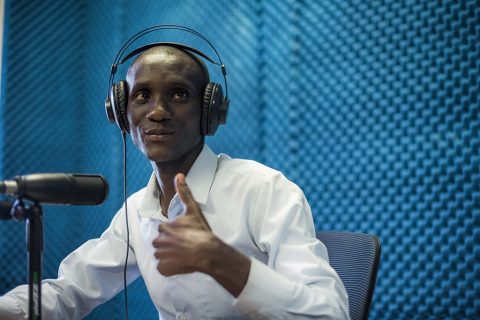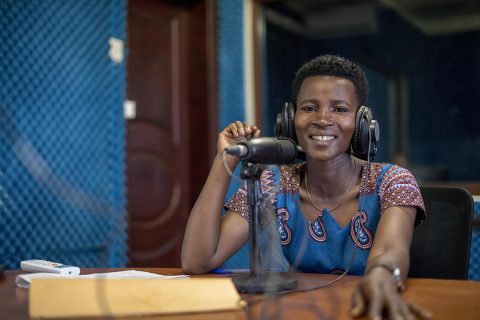Teachers stay passionate despite closing of schools: Our priority is to keep learners motivated
Teachers around the world have played a vital part in the fight against the coronavirus throughout the pandemic. On World Teachers’ Day October 5, we want to appreciate all teachers for their tremendous efforts.
Covid-19 was declared a global pandemic on March 11, 2020, and forced schools to close in most parts of the world. Particularly in vulnerable communities, such as refugee settlements, teachers have found themselves in the frontline of the pandemic response.
Teachers raise awareness on Covid-19 and measures to curb the spread of the coronavirus. They have also adopted new ways of teaching in a situation where education must continue and distance learning remains the only solution. Countries like Uganda had to discover new ways of learning from home.
Due to limited internet access, refugee settlements in Uganda have relied largely on lessons broadcasted on radio. Finn Church Aid (FCA) has supported the government’s policies of social distancing and distance learning by distributing radios and home learning packages to learners and their families, also enabling them to follow updates on the Covid-19 situation.
FCA along with UNHCR Uganda, with funding from EU Civil Protection and Humanitarian Aid (ECHO) and Education Cannot Wait, distributed 1,403 radios and 141,825 home learning packages to learners in refugee settlements in Southwestern Uganda and the West Nile region.
Godfrey Baryakaijuka and Annet Rukundo have conducted radio lessons on Radio Nyumbani and supported home-based learning in Rwamwanja refugee settlement. They support the learners at their homes with working on their home learning packages that complement the broadcasts.
Godfrey Baryakaijuka, teacher

Photo: Hugh Rutherford / FCA
I walk from home to home, checking the assignments of learners and helping them with what they may find difficult. I sometimes walk very long distances as there are learners that stay in villages far away from me. The weather is not always favourable. It can be difficult to move when it is either too hot or if we are having heavy rains. On radio, I have conducted lessons on English and Mathematics for Primary 3 learners.
Teachers work hard to maintain the connection between the schools and the learners and to ensure that learning continues. I find that some learners have resorted to agriculture during school closure because of staying home for too long. I take it upon myself to approach these learners and encourage them. Teachers follow the procedures set to fight the Covid-19 pandemic and also remind families of the importance of social distancing and wearing masks.
I love being a teacher, not even school closure has affected my passion. I enjoy giving guidance to my students and being a source of comfort for them. Many of them ask me if schools will ever open or if they will ever see their friends at school. I keep reassuring them that there will be a day when they can all return to school.
My biggest priority during this pandemic is to keep learners motivated and eager to continue with their education regardless of the obstacles.
Annet Rukundo, teacher

Photo: Hugh Rutherford / FCA
Most learners I interact with keep asking me when they can go back to school. It makes me very proud because I know that a lot of them want to return. Parents also show a lot of interest in their children’s learning. When there was a lockdown in the refugee settlement, most of the teachers also stayed at home. We were very happy when we were called back to teaching.
I have conducted radio lessons on English for Primary four and five over the radio. During my lessons, learners within the community would reach me via phone for further explanations while on air. Before the home learning packages were distributed and radio lessons conducted, I would see learners usually around the school playgrounds and compounds idle and doing nothing. The lessons have kept them engaged with learning at home.
One of the challenges of distance learning was that some learners had no access to radios. Some who did could not afford to buy airtime to their phones, and therefore could not call the teacher for further assistance. In addition, delivering lessons on the radio is teacher-centred and not learner-centred.
In a class, you are able to give learners more attention whereas, on the radio, you would not be able to know if what you are teaching is well understood or not. When it was time to receive calls on the live radio broadcasts, the lines would usually be busy. It was hard for learners to reach the teacher.
I am now conducting home-based learning within the community and reach out to learners in their homes. We teach from Monday to Thursday and on Friday, we teachers meet to review and discuss challenges and agree on a way forward. We also have inter-school meetings with other teachers to share experiences and work at improvising better teaching methods.
I am glad that schools gradually start opening on October 15 starting with candidate classes as decided by the government of Uganda. I know the learners are excited and this makes me happy.
Education remains key in any situation we might encounter.
The teacher interviews were conducted by FCA Uganda’s Communications Officer Sharon Shaba. FCA along with the UN Refugee Agency UNHCR supported learners in Rwamwanja refugee settlement with home learning packages and radios.